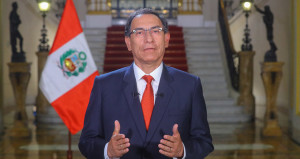Carlos Sánchez Berzaín
October 16, 2018
 (Interamerican Institute for Democracy) While the struggle to recoup democracy is focused on the atrocities of the dictatorships from Cuba, Venezuela, Nicaragua, and Bolivia, these regimes carry out a regional plan to sustain themselves. Their dictatorial strategy seeks the greatest destabilization of Americas’ democratic governments through social, political, electoral, and criminal meddling and publicity. It is about destabilizing democracy wherever possible and facts now point out that Peru is now enduring the pressures of the application of that agenda.
(Interamerican Institute for Democracy) While the struggle to recoup democracy is focused on the atrocities of the dictatorships from Cuba, Venezuela, Nicaragua, and Bolivia, these regimes carry out a regional plan to sustain themselves. Their dictatorial strategy seeks the greatest destabilization of Americas’ democratic governments through social, political, electoral, and criminal meddling and publicity. It is about destabilizing democracy wherever possible and facts now point out that Peru is now enduring the pressures of the application of that agenda.
Hugo Chavez allied himself with Fidel Castro in 1999 when Cuba agonized in its “Special Period” as a parasite state that, since the breakdown of the Soviet Union, did not have a way to survive. With Venezuela’s oil, Chavez salvaged the only dictatorship there was at that time in the Americas and kick started the recreation of Castroist expansionism under the labels of Bolivarian Movement, ALBA Project, 21st Century Socialism, and today known as “Castro Chavism”.
The 21st Century in Latin America is marked by the influence, expansion, and fall of Castro Chavism identified as an Organized Crime’s system that usurps politics. With the Workers’ Party with Lula and Rouseff in Brazil, the Kirchner’s in Argentina, the ten years of the OAS’ subjugation with Insulza, the control of Central America and the Caribbean with Petrocaribe and the FARC from Colombia, they established –amongst other things- history’s greatest transnational corruption system. Ranging from the establishment of narco-states and money laundering, to contracts for the construction of mega projects financed by Brazil, with Brazilian companies manipulated by Castro, Chavez, and Lula that brought to light the “Lava Jato” scandal and the “Odebrecht” case.
After having been a victim of Castroist related guerrilla and terrorism, Peru was always a Castro Chavism objective, but they were not able to set up a regime similar to Ecuador’s with Correa, Bolivia’s with Morales, Venezuela’s with Chavez and Maduro, and Nicaragua’s with Ortega, where with a populist discourse, supplanting their institutional system, with constitutional reforms and/or constituent assemblies, referendums, annihilated the Rule of Law and concentrated the government’s power in order to be able to indefinitely retain it.
With some of Peru’s governments, Castro Chavism was able to obtain their vote at international organizations and their support, complicity or indifference to the Human Rights’ violations and the breakdown of democracy that Castro and Chavez accomplished in the region. They influenced in the internal politics and electoral processes with relative results. Castroist Chavist’s presence in Peruvian politics has not been and is not no less because of the nature of the country and the amount of resources that it has in its antidemocratic quest.
What Castro Chavism was able to accomplish in Peru was to involve it in the corruption scheme of Odebrecht and Lava Jato that led to the fall of President Pablo Kuczynski. The Cuban dictatorship that leads Castro Chavism’s efforts, since the death of Chavez, manages machiavelically the corruption scheme because it uses it to cover up its loyal subjects in Cuba, Venezuela, Bolivia, and Nicaragua where the Odebrecht case and Lava Jato and other scams are covered up, but it also applies it as a political weapon in the region such as in the case of the President of Peru PPK.
Lately, Lima’s Cardinal and Archbishop Juan Luis Cipriani denounced that “a dark and very strong power is slowly taking over and coincidental events are happening, some stay comfortably in their homes, others stay in jail”. Peru’s top religious authority points out that “there is a strategy to shut down Congress” and that “the attacks are part of a strategy that was able to destroy the Judicial Branch” claiming that “there is a battle between the three Branches of Government” and pleads for the defense of democracy with the argument that “it is worthwhile to ask for, on behalf of the Rule of Law and on behalf of the country’s welfare and the people, some dialogue and no threats either from one side or the other.
The destruction of democracy in Venezuela, Ecuador, Bolivia, Nicaragua and the attempts to do the same in Argentina and Brazil and other countries were abiding by the agenda that now involves Peru. It attacks the multiple political party system, it eliminates civic leaders they Satanize as traditional, they force a collapse of public trust in governmental institutions, they dynamite democracy’s prestige and afterwards through populist manipulation they change the country’s constitution and eliminate the Rule of Law.
*Attorney & Political Scientist. Director of the Interamerican Institute for Democracy.
Published in Spanish by Infobae.com on Sunday October 14, 2018
 Carlos Sanchez Berzain Abogado | Estadista | Político | Politólogo
Carlos Sanchez Berzain Abogado | Estadista | Político | Politólogo